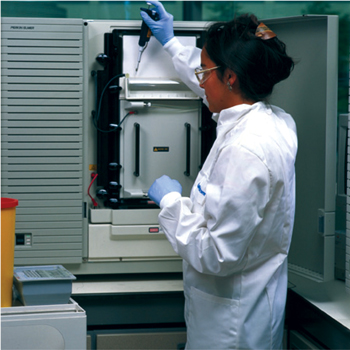"One of the most important R&D strategies to achieve a significant gain of efficiency is to tap into external knowledge and expertise through a network of external alliances, sharing the risk, reward and control. Given the large investments in drug research, Virtualisation provides a great savings potential," summarizes Professor Ulrich Trottenberg, director of Fraunhofer Institute for Algorithms and Scientific Computing SCAI, the SIMDAT project co-ordinator, the current challenges in pharmaceutical drug discovery.
"With the distributed nature and diverse location of biological data for disease and medical treatment, it is becoming vital to be able to fast and flexible connect to these resources. Grid as a key part of Information Technology supports the organisations' rapid movement into the virtualised and now more globalised information market," says Rob Gill, Head of Biology Domain Architecture at GlaxoSmithKline (GSK). "The SIMDAT Grid technologies developed by GSK, NEC, Inpharmatica (Galapagos), InforSense and Fraunhofer Institute for Algorithms and Scientific Computing SCAI provide a new business model in the life science sector, which can be considered as a success of the project as a whole."

Usually, establishing new relationships by creating a new virtual organisation (VO) may take up to several months. But the 'Data Grid' paradigm can reduce this to weeks or even days. The VO in this case demonstrates how a pharmaceutical company could partner with an academic group and a vendor company to look at a specific disease and drug target. The duration of this relationship depends on the questions asked and the costs incurred by the interaction. Biotech, on the other hand, has the opportunity to get access to new markets and, hence, is in the position to increase its commercial offer by implementing a finer grained product portfolio.
Knowledge exchange within SIMDAT is not bound to local infrastructure but is tending away from organisational, process and technology limitations. Thus, pharmaceutical companies like GSK have now the possibility to scale their business relationship with both biotech companies like Inpharmatica (Galapagos) and academic partners. That is, they can restrict themselves to exactly those resources they are interested in and are not forced to subscribe to a complete and costly product. This can be realised by new, grid-based middleware components, used to securely and transparently integrate distributed data repositories, in combination with distributed execution of process chains.
Through Virtualisation pharmaceutical companies like GSK are now capable of scaling their business relationship with both industrial and academic partners and take advantage of its great savings potential. In addition, globalisation is getting more and more crucial to keep up in an international context, especially considering the rate of growth of scientific and technical graduates in Asia is already outpacing the United States and Europe. Virtualisation has also the means to benefit from this wealth of knowledge along with developments in the global market.
Current industry applications can already take advantage of SIMDAT technologies. This was successfully demonstrated by a workflow-based test system implemented at GSK by
InforSense, consisting of five different remote sites and including data services of two external companies. The development of this workflow is driven by the need to get high quality, state of the art analysis for pharmaceutical companies from wherever it is best sourced. Thus was shown that pharmaceutical R&D processes can be outsourced across multiple organizations, even if they are using different specifications. Thereby the central industrial requirement for a controlled and secure interaction has been fully addressed through internet security models provided by NEC.
As a powerful tool for knowledge exchange, SIMDAT technology broadens the scope of the drug discovery chain and is able to import the best of bread analysis from both academia and vendors at appropriate costs. It is an ideal showcase for potential providers who are interested in working with pharmaceutical partners in a more collaborative and beneficial manner rather than purely in a simple vendor consumer relationship.
SIMDAT has been funded by the European Commission under the Information Society Technologies Programme (IST). Since it's launch in 2004 SIMDAT has successfully installed Grids in various industrial prototypes in the aerospace, automotive, pharmacology and meteorology sectors.
Link:
http://www.simdat.eu/
Please contact:
Clemens-August Thole
SIMDAT coordinator
Fraunhofer Institute for Algorithms and Scientific Computing SCAI
Tel: +49 2241 14 27 39
E-mail: clemens-august.thole![]() scai.fraunhofer.de
scai.fraunhofer.de










